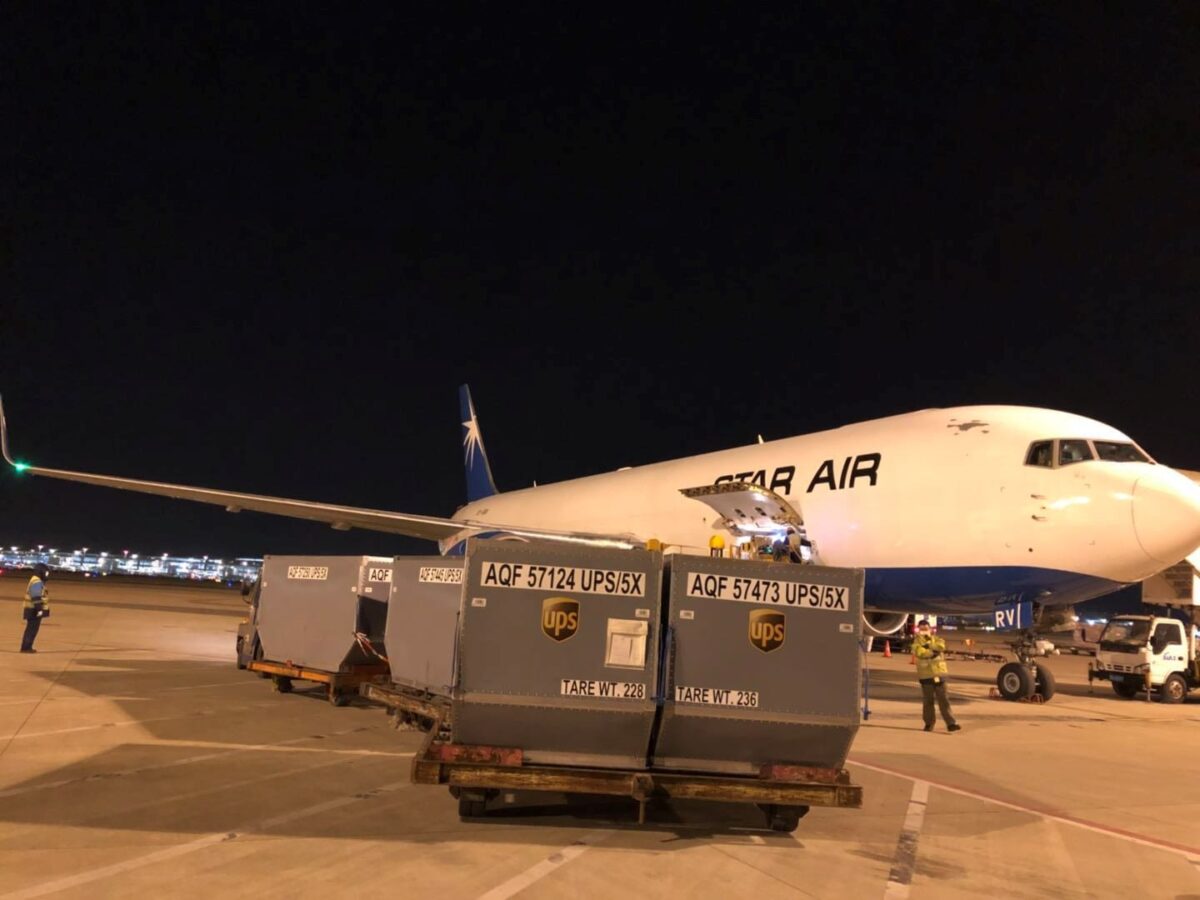While news headlines focus on sustainability concerns and climate activist protests against business aviation, what goes underreported is the missions that save lives or reunite people with their loved ones.
Universal has a long history of supporting humanitarian missions and delivering critical aid during natural disasters like earthquakes and tsunamis.
A New Threat Emerges
As COVID-19 was beginning to change the world forever, personal protective equipment (PPE) was dwindling fast, and there was a palpable fear that hospitals in the United States would not have the necessary equipment to care for the country’s rapidly growing number of COVID-19 patients.
Striking a Deal & Finding an Aircraft
In Massachusetts, Governor Charlie Baker found a source to supply much-needed PPE to his state’s overwhelmed healthcare workers. Baker struck a deal with a manufacturer, Tencent, in China for the needed PPE. However, getting it from China to the United States was going to be the hard part.
New England Patriots Owner Robert Kraft stepped up after learning about the need for an aircraft to make the delivery. Kraft offered to use the Patriots’ Boeing 767, which was usually used to charter the team to away games. With the PPE sourced and the aircraft secured, next came the logistical gauntlet of navigating the complex bureaucratic channels of embassies and civil aviation authorities.
Navigating Regulatory & Diplomatic Complexities
Having never operated this type of mission before, the Kraft group began seeking advice from fellow companies on how to proceed. One of those was a large Fortune 500 company, which had recently completed a COVID-19 repatriation flight from Morocco with the support of Universal. Trusting in Universal’s expertise and resources, this flight department recommended Universal for the mission.
Formulating the Plan
Having recently coordinated a similar mission for the CEO of a major Chinese e-commerce company, Universal knew how to pull off a mission like this quickly and the many hours of work ahead needed to pull it off, despite the challenges caused by the rapidly evolving COVID-19 restrictions. As a consultant with Kraft’s operations team, Universal’s experts laid out the plan to navigate the diplomatic waters.
It all started with the Embassies. Universal provided the procedures and best practices for how the Kraft team and Tencent in China could effectively engage their respective embassies to get the required permissions, which each company then followed.
Aircraft Modifications
In the meantime, the 767, which doesn’t usually operate internationally, needed new avionics equipment installed before it could operate to China. Universal helped the Kraft team identify what equipment was needed and what other preparations were required for this first international mission to China.
Negotiating Lead Times for Time-Critical Mission
Things got moving once the two Chinese and American Embassies started talking to each other. After each embassy authorized the trip, it was time to talk with the Chinese Civil Aviation Authority (CAA).
Typically, the Chinese CAA’s lead time is 15 days for an operating permit for any private aircraft with more than 19 seats. Obviously, this timeline wouldn’t work, as every day delayed meant potential lives lost.
Universal’s ground support office in China, Universal Aviation China, was able to leverage its relationships with the Chinese CAA to whittle the original lead time of 15 days to just a few, securing the final permissions needed to make this mission happen.
One challenge overcome…but not in the clear yet.
Three Hours to Load a Million Pieces of PPE
Due to duty-hour restrictions, the aircraft could not spend more than three hours on the ground in China, and it needed to load more than a million pieces of PPE onto the aircraft in that time – a daunting task. The Kraft flight had two full flight crews onboard, and the plan was for one crew to fly while the other slept, then they would switch roles upon arrival.
Universal Aviation China had a plan, as well. It sent a ground supervisor on a flight from Beijing to Shenzhen in advance, where the supervisor quickly sourced 25 porters to load the cargo upon the aircraft’s arrival. The supervisor then had to coordinate the pickup of the PPE from various locations in Shenzhen, as the PPE was scattered across the city in many different warehouses. The supervisor worked with Tencent, the PPE provider, to ensure all the equipment was picked up, cleared customs, and stood by for the aircraft’s arrival.
The Human Assembly Line
Once the aircraft was back on solid ground, Universal Aviation China’s ground handling team pulled the empty pallets from the cargo hold. Then, the team of 25 porters loaded each box by hand, prepping the pallets to load onto the aircraft.
Loading more than one million pieces of PPE onto a 767, even with 25 people, is usually a 5-hour job. Then, add in the aspect of everyone wearing full PPE, and the job was even more difficult. The team pulled it off in two hours and 55 minutes – meeting the three-hour window just in the nick of time.
A Message of Gratitude
Shortly after the flight took off en route to Anchorage, the Universal team received the following message from the Kraft team.
“I cannot thank everyone enough for all the efforts over the past week and some longer to make this mission a success. While the overall mission is not complete, we have departed Shenzhen for our journey to Alaska and onto Boston and New York to deliver these life-saving supplies to those doing battle on the ground.
Our doctors, nurses, and first responders have been heralded as heroes for good reason, but I would also say that each one of you on this mission and everyone who participated on your teams is a hero. You all showed great courage and drive to serve others in need. I, as well as the Kraft family, have great appreciation for what you have done and accomplished to date. No small feat.”
Missions like these highlight business aviation’s important roles during challenging times.

